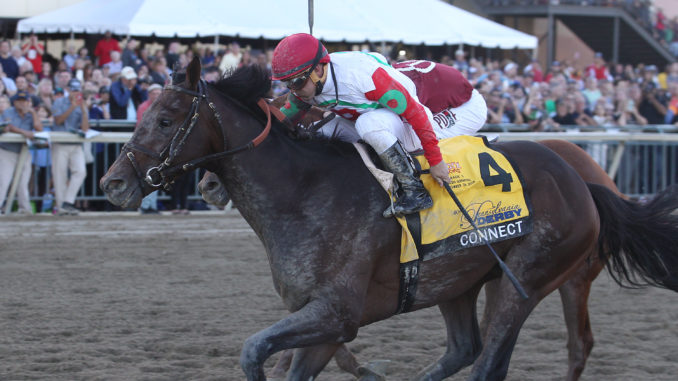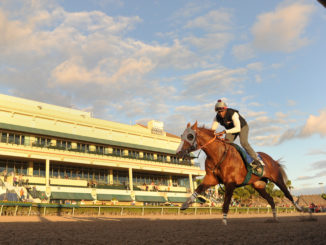
Using up roughly two weeks of paid vacation on either side of my recent excursion to Hong Kong, there’s been a few noteworthy items in the racing world that I wasn’t able to address during my absence. Time to play catch-up.
Grades
The American Graded Stakes Committee took a scalpel to the Blue Grass, Mother Goose, and Wood Memorial, demoting all three from Grade 1 to Grade 2, while elevating the Pennsylvania Derby from Grade 2 to Grade 1 in the most significant grade changes for the 2017 season.
I won’t go into a detailed discussion why two historically significant Kentucky Derby (G1) preps like the Blue Grass and Wood Memorial have lost their some of their cachet with horsemen. Suffice it to say 2017 won’t be either race’s first rodeo as a Grade 2 event, and date changes in recent years from three weeks to four weeks out from the Churchill Downs classic didn’t appear to help their cause.
Let’s face it, weather can be dicey in New York and Lexington the first weekend in April, and it’s no surprise horsemen with leading Derby prospects seem to prefer turning in their final preps in Miami, Hot Springs, New Orleans, and Los Angeles, where weather (other than the threat of rain) is generally not much of a concern.
The demotion of the Mother Goose I really don’t get considering fillies like Proud Spell, Rachel Alexandra, Believe You Can, Close Hatches, and Untapable have all won or placed in it in the past 10 years. I often wonder whether The NYRA does a sufficient job allocating enough resources to ensure all of their top-level races stay that way. For example, would the fields for the Acorn ($700,000), Belmont Derby ($1.25 million), and Belmont Oaks ($1 million) suffer that much if, say, 10 percent of their purses had been diverted to shore up the status of a race like the Mother Goose?
The bottom line is that we’re still talking about too many races chasing too few horses. It’s unfortunate that the more storied ones are taking the brunt of the cuts in purse and prestige.
On that note, Ed DeRosa argues a change in venue and date is now appropriate for the Jockey Club Gold Cup (G1) lest it be next on the chopping block. The bigger problem for the Gold Cup, in my mind, is the powers-at-be have for more than a decade refused to make it a course-and-distance Breeders’ Cup Classic (G1) prep. I’d be interested to see how the Gold Cup were to fare as a Classic prep if Belmont Park were awarded a block of Breeders’ Cups like Santa Anita enjoyed earlier in the decade.
To the extent that races like the Gold Cup and Woodward (G1), which often used to be the first meetings between the generations, no longer attract the fields they once did is due in part to the encroachment of races like the Pennsylvania Derby. Of course, we’ve had late-season Grade 1s restricted to three-year-olds before (e.g. Super Derby, Pegasus), but this one in particular really seems to rub some people the wrong way.
Those that had their pants in knots about the Pennsylvania Derby not being an official Grade 1 can now stop hyperventilating. While grade justice seems to have been finally served for those that care about such things, the whole brouhaha seemingly underscores how little grades ultimately matter. Being a mere Grade 2 event didn’t hurt the quality of the Pennsylvania Derby the past four years, while being Grade 1s seemed not to have helped the three richly historic events mentioned above.
If the whole system of grading races disappeared overnight, I’d be overjoyed. The sport functioned well enough without it.
R.I.P.
The world prematurely lost former jockeys Walter Swinburn and Garrett Gomez within days of each other last week. In the wake of their deaths, I tried to remember when I first gained notice of them.
Being a bit on the young side compared to others, my first memory of Swinburn was not of him guiding Shergar or All Along, but being interviewed on NBC after Sonic Lady went down to defeat as the favorite in the 1986 Breeders’ Cup Mile (G1). Suffice it to say I soon learned a lot more about his most famous mounts and enjoyed from a distance his later North American successes with the likes of Hatoof and Pilsudski.
Gomez I obviously witnessed a lot more of, not just on TV but in person. I had to look it up, but I’m pretty sure Gomez won the first race I ever saw live at Oaklawn, on March 26, 1994. Later that meet he won the Arkansas Derby (G2) aboard future Breeders’ Cup Classic hero Concern. (I’ll have to dig out my old Fonner Park programs from 1989 to see if he was riding there at the time. Perhaps I saw him sooner.) It’s wins like that that made a growing racing fan mentally file his name away for future reference. In light of what subsequently occurred, I’m not surprised in the least he turned out to be one of the best in the land.
Two giants of the saddle never to be forgotten.
All in the family
Count me as one of those rare birds less captivated Saturday by California Chrome’s paid workout at Los Alamitos than with the Gran Premio Carlos Pellegrini (G1), South America’s most prestigious race, held that afternoon at San Isidro outside Buenos Aires.
Unfortunately, all I could do was watch the a streaming video of the Pellegrini on the San Isidro website rather than bet it because, for the second consecutive year, the race was unavailable for wagering in the U.S. A shout out to the presumed powers-at-be on Twitter regarding this oversight garnered no response.
With no wagering available I did little in the way of study for the heck of it, but in the wake of the result I wonder if I would have come up with winning three-year-old Sixties Song, who upset the 1 1/2-mile, weight-for-age event at track odds of 22-1.
By English classic winner Sixties Icon, Sixties Song shares a second dam with Breeders’ Cup Turf Sprint (G1) winner Bobby’s Kitten and current multiple Grade 2 winner Camelot Kitten. This is the family of U.S. champions Theatrical and Paradise Creek, Japanese star Taiki Blizzard, English champ David Junior, and Grade 1 turf winners Forbidden Apple and Wild Event.
In other words, Sixties Song would have been worth a play on pedigree alone. That’s some powerful bloodlines, winning the world over.



